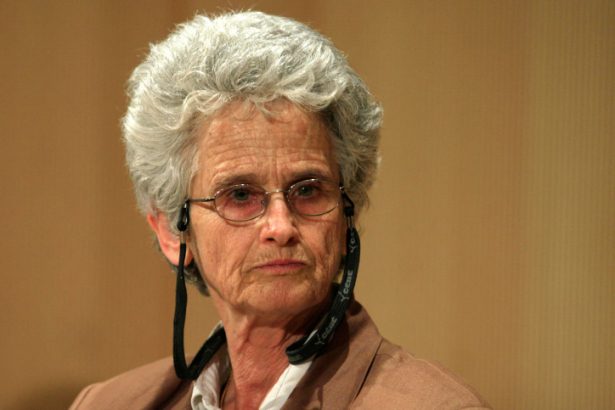Alexander Yakobson is co-author with Amnon Rubinstein of Israel and the Family of Nations: The Jewish Nation-State and Human Rights. He pays tribute here to Ruth Gavison, leading scholar in the field of law and society, pioneer in the struggle for civil rights in Israel, a founder of the Association for Civil Rights, who died on 15 August 2020. He argues that few people contributed more to our understanding of the dilemma that exists between protecting the rule of law and human rights by overruling public officials – a decision that often has significant political ramifications – and trespassing on the right of the people and their representatives to run the country.
Ruti – how sad and bitter it is to speak of her in the past tense. Everybody knows how brilliant she was. But what I am thinking of is her total honesty and sincerity. These things don’t always go together – a brilliant intellect and uncompromising intellectual honesty. When you heard her, whether you agreed or disagreed, you knew that what she was saying was her authentic, unadulterated opinion. The truth, the whole truth and nothing but the truth as she saw it. No ‘agenda’, no posturing, no public relations, no tactical considerations.
She dedicated her intellectual brilliance, her honesty and sincerity, and her passion, to two great causes: the cause of democracy and the cause of a state for the Jewish people. And these causes were worthy of such brilliance, such honesty, and such passion.
Ruth Gavison and the Jewish State
In the debate on the democratic legitimacy of the Jewish state, in which she played a central role for many years, we were on the same side. Fundamentally, this legitimacy is based, as she rightly insisted, on a principle that is accepted, ostensibly, by all opponents of the Jewish state – the right of peoples to national self-determination. Is there a serious argument against applying this principle to the Jews? Even those who would engage in a sterile dispute over Jewish peoplehood cannot deny the peoplehood of the Hebrew-speaking Israeli Jews – if only because nobody claims them as part of ‘their’ people; and Israeli Jews, like other peoples with a diaspora, don’t need anybody’s licence for their ties with it. That there are two peoples in this land cannot be seriously denied by anybody – least of all by those who support the right of the other people in the land between the Jordan and the Mediterranean, the Palestinian Arabs, to national independence.
All arguments against the Jewish state are actually arguments against Israeli official policies, against the Israeli regime, against the Jewish national movement, against (parts of) the Jewish Israeli public, sometimes against aspects of Jewish culture and tradition. Can any people’s right to national independence be denied on such grounds, whatever the truth or untruth of the specific allegations? Is it the case that a licence to national independence is usually granted only to liberal and strictly secular societies and cultures, only to national movements that have never been involved in a national conflict, or whose conduct in such a conflict has been irreproachable, and only on condition that they maintain a democratic political system and elect only progressive governments?
So Ruth was right to defend the Jewish state. She was not somebody who believed in fairness and universal human values and at the same time, or nevertheless, supported the Jewish state. She supported and defended the Jewish state because she believed in fairness and universal human values no less than because of her identification with and deep attachment to her people. She also well appreciated the gravity of the danger that the Jewish state faced as a result of the Israeli rule over the Palestinians in the territories.
Ruth Gavison and Judicial Activism
The other great controversy in which she played a leading role concerned the place of the judiciary in the Israeli democracy. Here things are more complicated – in Israel and elsewhere, since arguments over this issue are found in many democracies. They are rarely black-and-white, usually a matter of degree and the task is to find the right balance. But these matters are often of crucial importance, touch on fundamental principles and involve strong beliefs and cultural sensitivities. Ruth was a lawyer and for many years was the president of the Israeli Civil Rights Association. She was deeply committed to civil and human rights and to the judicial defence of these rights. But as long ago as the 1980s, she began developing an opposition to excessive judicial activism. She warned against a tendency to seek, and impose, judicially-mandated legal solutions to problems that are essentially political.
Of course, the proper borderline between the two spheres is often blurred, and controversial; it can be easily crossed from either side. When I first heard Ruth’s criticism of Israel’s judiciary, I thought she was exaggerating. I didn’t think she had no case, but I believed that one should focus on the crucial role played by the Israeli judiciary – and specifically the High Court of Justice – in protecting civil and human rights and the rule of law. Over time, I started to think that her criticism was more justified. For quite a while now I have agreed more than disagreed with her on this – though our views were not identical. In recent years, it has seemed to me that the brutality of the attacks launched on the judicial system, and on the High Court, by the increasingly illiberal right, remains the main problem – though this should by no means make the system itself immune from criticism. No good liberal should assume that any powerful establishment – as the judicial system is, and must be – is incapable of overreaching and abusing its power. Just as powerful politicians are sometimes apt to overlook, or brush aside, legal restraints, powerful lawyers are sometimes apt to overlook the fact that they are not philosopher-kings.
I would like to exemplify some of the aspects of this controversy by bringing up one crucial and topical issue – judicial quashing of appointments for reasons of ‘unreasonableness’, without statutory authority. In its famous ‘Deri ruling’, in response to a petition brought by social activists, the High Court ruled in 1992 that Aryeh Deri could not remain Minister of the Interior after being indicted on corruption charges (that would eventually bring about his conviction and imprisonment). Deri’s forced resignation resulted in his party, Shas, quitting Rabin’s cabinet, thus depriving the coalition of its absolute majority, and abstaining in the Knesset vote on the Oslo agreement (which Deri had originally welcomed). This is what gave the opponents of Oslo the powerful weapon of the ‘no Jewish majority’ mantra. The High Court judges made haste (something that does not always characterise them) to dismiss Deri from Rabin’s government on the eve of the fateful vote on Oslo (and not, say, a month later), in an unprecedented display of judicial activism. This was a devastating blow to Rabin’s government, and to Oslo. This case clearly demonstrates how false and unfair it is to claim that Israel’s prosecutors and judges (including Aharon Barak, who sat on the bench in this case) act politically in favour of the left and against the right. Incidentally, the right did not then raise its voice against this striking example of judicial activism; nor would it later find anything ‘undemocratic’ about ‘unelected officials bringing down a democratically elected Prime Minister’, by means of a criminal investigation and prosecution, when the Prime Minister in question was Ehud Olmert.
My own view at the time was that this ruling of the Court, while highly damaging to the political camp I was supporting, was an important positive contribution to the rule of law and to upholding proper ethical standards in government. I now believe I was wrong, and that Ruth was right in her criticism of the Court on this issue and on various similar ones. This was an overreach and a beginning of a ‘slippery slope’ that dragged the Court – as Ruth warned it would – into the very heart of the political rough-and-tumble. Of course, there were strong reasons for this decision. It is not as if the judges suddenly decided that they wanted to control ministerial appointments. It is indeed nothing short of outrageous for a Minister of the Interior charged with corrupt abuse of his powers, among other things by virtue of his control over local authorities, to be allowed to continue exercising those powers, as a minister in charge of those authorities, while under trial – just as now it is outrageous that an accused in a corruption trial continues serving – if this is the right word – as Prime Minister. The temptation, for the judges, to prevent this outrage by legislating from the bench was quite understandable. However, it should have been resisted. Assuming that a democratic political process, however unsavoury, is ultimately an exercise of the people’s political freedom and right to self-government – an assumption on which modern representative democracy is based – the people have an undeniable right, one that every democrat is bound to acknowledge, to elect – however ‘unreasonably’ – those who will govern them. Judges can quash official acts of those elected by the people, but not the election itself (direct or indirect) – unless the people themselves have accepted, through the democratic political process whose outcome is expressed by legislation, a limit on their freedom to choose.
On the other hand, the demand, voiced by some of the Court’s critics, that it should stop using broad criteria such as ‘reasonableness’ and ‘proportionality’ in its case-law while reviewing acts of public officials, makes no sense. Among all those critics, there is surely not a single one who would not insist, if he or she wanted to organise a demonstration and the police used their legal powers to ban it, on the judges of the ‘hated’ High Court subjecting this ban to the test of reasonableness and proportionality.
Plunged into Politics
By following the logic of the Deri precedent, the Court opened the door to petitions asking it to quash as ‘unreasonable’ all kinds of appointments, sometimes for reasons less weighty than a criminal indictment (including objectionable public statements in the past), thus plunging itself into the depth of various political controversies. The power of removing public officials, or preventing them from taking office, on grounds not spelled out in any law, but established from case to case by the judges, is an excessive and potentially arbitrary power that no judge in a democracy should ever claim or wish to possess. Eventually, the Court, faced with the matter of Netanyahu remaining (and then, being re-appointed) as Prime Minister while under indictment, pushed itself into the corner of having to either legitimise this by its moral authority (as a court that is famously not bound by ‘formal’ criteria in its ruling), or to prevent it without any statutory authority. In fact, the Court had to rule on whether the Knesset majority – and thus, indirectly, the Israeli electorate – had a right to keep, or to install, a Prime Minister of its choice – without there being any law that limits its choice in this matter. The law, indeed, says that a Prime Minister only has to resign following a final conviction. But many people have been asking quite reasonably: how can it be that a Prime Minister’s non-resignation, following indictment, is not considered as even more ‘unreasonable’ than in the case of a minister? Of course, what these people expect from the Court is not at all a judicial ruling but an act of legislation – actually, a constitutional amendment (since this matter is regulated by a Basic Law). But this expectation itself is not wholly unreasonable, based on the Court’s record since the ‘Deri ruling’.
The Court solved the impossible dilemma by refusing to disqualify Netanyahu as Prime Minister, on the grounds that a decision to remove a Prime Minister is more weighty, politically, than a decision to remove a minister, hence the political system should enjoy greater leeway, and the Court should exercise greater restraint. Unfortunately and inevitably, many people did not take this decision as a display of judicial restraint. Rather, they took it as a surrender to the quite explicit, and credible, threat that had been voiced on the right: that if the Court ruled against Netanyahu, this would lead to a new election which, hopefully, would produce an absolute majority for Netanyahu – a majority that would then turn on the Court and clip its powers. And indeed, an election in which the central question is framed as ‘who has the right to decide who should be Prime Minister of Israel – the people or the lawyers?’ would be, for Netanyahu’s supporters, a gift from Heaven. Having entered this arena, which it should never have approached, the Court was bound to lose either way, whichever way it decided.
There are some things in a democracy that even a popular majority, acting through its elected representatives, has no right to do – above all, violating fundamental civil and human rights. A democratic constitution usually gives the judiciary the right and duty to overrule the majority in such cases. Of course, such rulings, too, are an exercise of (judicial) power, with the dangers that this entails. No exercise of power, however necessary, is without its dangers, and no power on earth should be given blind support. But in principle, this is a proper function of the judiciary, and any attempt to deprive it of this power, as the Israel right now wishes to do, should be strongly opposed. But there are also, obviously, some things that a democratic majority does have a right to do. The right of the people to elect those who will govern them is the very heart of representative democracy. This right can only be limited by the people – in practice, under our system, by the Knesset – that is to say, by a statute. No judge in a democracy should wish to have the power to deprive the people of this right without their consent – however great the temptation to do so, for perfectly valid public reasons. This right is by no means merely ‘formal’. It is a matter of public liberty, and for the individual voter – of equality and human dignity.
The case of the ‘Deri ruling’ and its ramifications is, in my view, a clear example of the judiciary overstepping the bounds. In other cases, things are less clear-cut. The exact border-line between protecting the rule of law and human rights by overruling public officials – a decision that often has significant political ramifications – and trespassing on the right of the people and their representatives to run the country, is bound to be often disputed. Such disputes are, fundamentally, as the Jewish tradition puts it, ‘disputes for the sake of Heaven’. Ruth Gavison played an invaluable, unique role in this dispute. She was often right, in my opinion, and she always argued for the sake of Heaven.




































